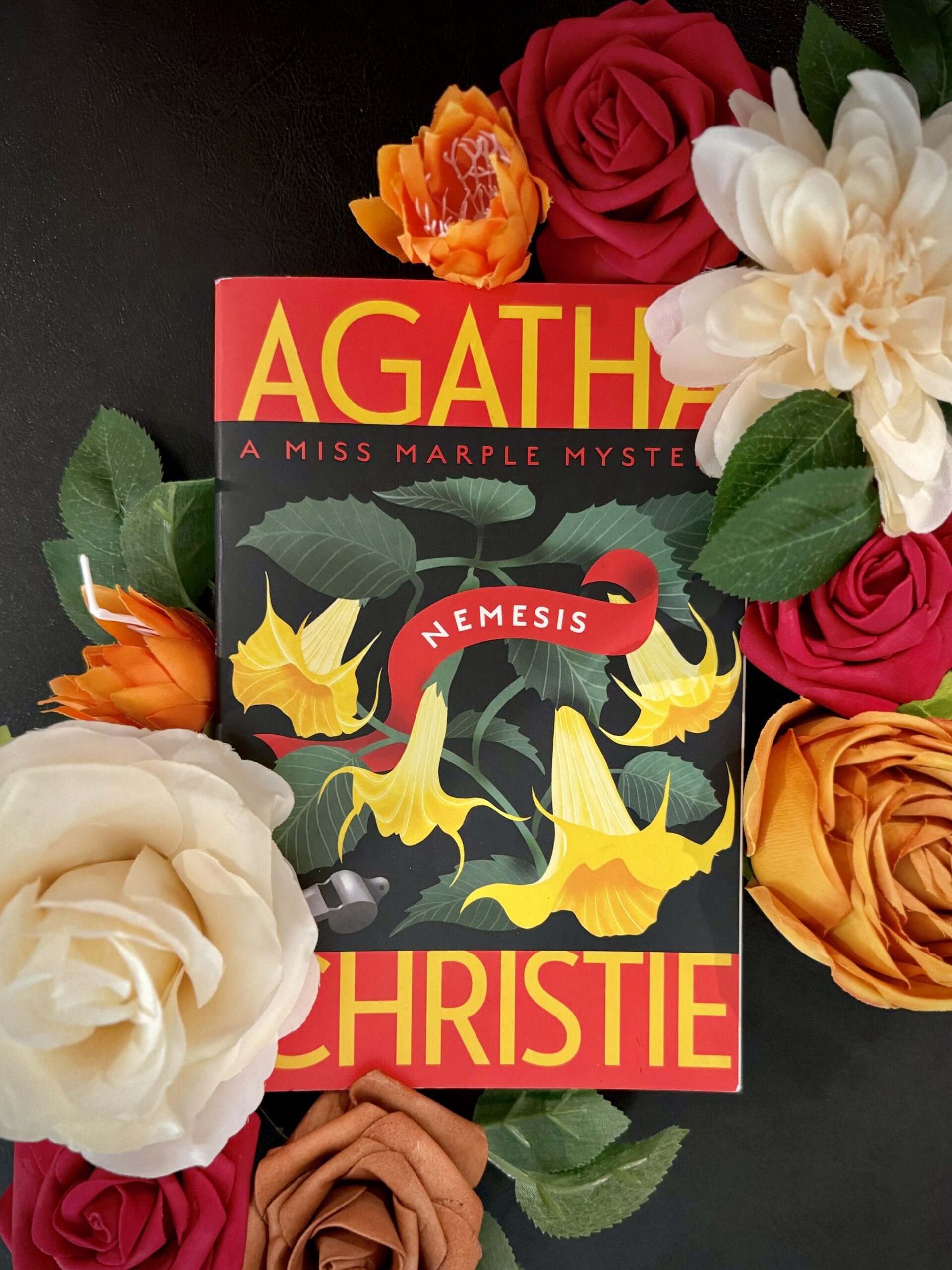Back to my favorite sleuth in one of her most famous adventures – Nemesis. Nemesis sticks out in the Miss Marple canon for a few reasons: it leans hard into series status, and it involves an interesting and unique collaboration from beyond the grave. Thematically, the story emphasizes Justice and Choice, with character choices and plot beats that demonstrate its importance. It’s Miss Marple at her most righteous, and far from both her fluffy stereotype and her more vinegary roots.
To me, this is a distinct evolution of the character. We’ve seen sparks of this in earlier novels, but typically Christie has included some “gives” that make that attitude easier to swallow. It’s easy to align with Justice when that also aligns with kind, caring people – or at least those who have been unfairly maligned. It’s harder when many of the players are unpleasant – and it’s a stronger message. The collaboration with Mr. Rafiel extends this theme further, with novel Rafiel focused on the truth. It’s clear Christie has a Message to Share, and it’s worth exploring the many tools she uses to land it, from the plot structure to the characters themselves.
Mr. Rafiel’s priorities
The first place to start is on the mission itself. Nemesis has a singular plot structure in the series: instead of investigating a murder in the vicinity, Miss Marple investigates a cold case. Not only that – instead of finding the mystery herself, Miss Marple is pointed at it by Mr. Rafiel. And he does it from beyond the grave, lining up a series of activities for her to ensure she has access to the facts.
This begs the question – what does Mr. Rafiel want? Does he have some kind of ulterior motive? Rafiel’s motives let us know how to interpret Miss Marple’s actions, what higher purpose she serves. It’s easy to assume, for example, that he wants to exonerate his son, deeply involved in the case. After all, why wouldn’t a father want to see his son proved innocent?
But to the contrary, he seems focused on Justice and Justice alone. Christie (and Rafiel) use a number of tools to establish this, starting first with the Bible quotation he sends Miss Marple.
“Let justice roll down like waters, and righteousness like an ever-flowing stream…”
Jason Rafiel, Nemesis
While a good starting point, this could just be a way to dress up a request with an ulterior motive. So Rafiel goes out of his way to establish Miss Marple’s investigative independence. She floats around for a few months, not really able to even understand the ask. When she finally receives the invitation for the tour, it’s weeks after the bequest. And while he sends Miss Marple collaborators, he doesn’t lead them in any particular direction. She’s on her own – on the tour, on the investigation, in the pursuit of Justice. Miss Marple gets full independence to draw her own conclusions.
Christie addresses this textually, too. When she finds out Rafiel’s son was involved in the case, Miss Marple deliberates on whether Mr. Rafiel simply wanted to exonerate him. She comes to the conclusion that, no, he wanted the Truth and Justice – not exoneration.
Rafiel the Younger
So let’s talk about the son – Michael Rafiel. Given that he’s a potential beneficiary of Miss Marple’s sleuthing, you might expect him to be sympathetic. Ideally, he’d be clearly unfairly maligned. And he might even make an appearance in the story, just so you could know who you’re rooting for.
Instead, Christie makes him EXTREMELY unlikable. Everyone in the local village hates him – and for good reason. He’s a flirt, a criminal, generally a very reasonable object of suspicion. Not even his father likes him – Mr. Rafiel just wants to find out the truth, whether or not Michael comes out well from it.
Michael’s only redeeming quality is the victim’s love for him. As Miss Marple investigates, she learns that, despite their differences, the two appeared to love each other deeply. In fact, they were engaged to marry, with Verity determined to take the hard path to “save” him. And as she reveals the truth, Christie frames the murderer’s crime as the theft of both life and choice. Michael may have been a wrong ‘un – but Verity should have had the choice to love him.
Note that Christie is more than capable of writing sympathetic characters. Making Michael unlikable is a choice – this is not a tale of redemption, but of Justice. In her role as Nemesis, Miss Marple represents the importance of Truth, or Revelation.
The series context
It’s worth noting briefly, too , that Nemesis is the most series-esque of the Miss Marple books. It’s not just that the plot relies on Mr. Rafiel, a character introduced in another book. Instead, Miss Marple’s investigation involves other characters from that escapade. Not only that – Miss Marple references her time at Bertram’s Hotel, and she bonds with another character over Sir Henry Clithering. It’s fascinating to see this change – and a shame that we don’t get more of it.
It’s not just literal reference continuity, though. Nemesis weaves together many of the themes we’ve explored in other Miss Marple novels. There’s the prison psychiatrist and the question of criminal reform. There’s the idea of a concurrent death, first explored in this series in The Body in the Library. There are little references to Miss Marple’s expertise in gardening, and a house of spinsters with… tense relationships. Nemesis feels like a culmination of Marples, the Marpliest of the series.
It’s a tough act to follow, and we will see what happens from an adaptation standpoint next week. Until then – stay cozy, and stay curious!
P.S. This may be very Millenial of me, but the title now just makes me imagine Dr. Doofenshmirtz. So thanks, Perry the Platypus, for that.
